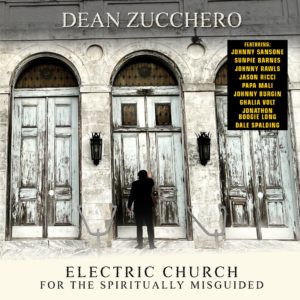Since moving to New Orleans a decade ago, Dean Zucchero has certainly made his mark on his adopted city’s abundant music scene. The versatile Manhattan-bred bassist has shared the stage with many of the city’s luminaries. He thumped bass, co-produced, and co-wrote for Ghalia Volt’s first two albums, and had a hand in her latest offering, One Woman Band. During the pandemic, Zucchero launched his socially-safe Acoustic Blues Series at the German bistro Bratz Y’all featuring many of New Orleans’ blues icons.
The veteran’s debut album isn’t the typical frontman-led affair—Zucchero never gets close to the mic but plays bass on every track. Rather, this is a showcase of his songwriting, arranging, and production skills. It came about by cutting rhythm tracks with drummer Doug Belote at Rhythm Shack Studio to ascertain if he could get a certain ’70s vibe. Thumbs up on that. Zucchero pursued producing an album where everyone—primarily blues-centric vocalists and instrumentalists—was his guest, playing his originals and arrangements.
With approximately 24 session players, the guest list is a veritable 11-track Jazz Fest. Johnny Sansone, one of the early adopters of Zucchero’s novel idea, delivers a thunderous vocal performance on “Mortal Man.” Harp shaman Jason Ricci is lip-peeling blistering on “DBA,” one of the album’s two instrumentals. Guitarist John Fohl torches the other one, “La Belle Poursuite,” while former Crescent City guitarist Johnny Burgin gets his funky swagger on “Stack It.”
Zucchero’s design was not to make his bass playing prominent, but his understated pulse is noticeable, especially on “Empty Postbox,” where it’s just he and Bruce “Sunpie” Barnes, who sings and plays harmonica with lots of emotional expression.
Other highlights include Jonathon “Boogie” Long’s talking narrative on “Craft Beer,” that’s loaded with hip-sounding and rhythmic rhyming lines,” and Leslie Blackshear Smith’s sassy demeanor on “Facist Love,” featuring guitarist Papa Mali’s blues rocking assault.
Considering all the musicians shuffling in and out, the proceedings hold together amazingly well. The last track, “American Dream,” a radio-friendly, poppy-tinged rocker sung by Jeremy Joyce, admittedly breaks that norm for good reason. Zucchero had it in his song bag for decades and figured might as well include it this time. Ironically, it was the album’s first released single and recently hit number 60 on the iHeart Radio Chart, providing another angle to spotlight Zucchero and his talented congregation. In the album title, Electric Church for the Spiritually Misguided, Zucchero loosely refers to this as his “church.” With services like this, don’t be late if you want a seat.




